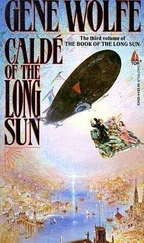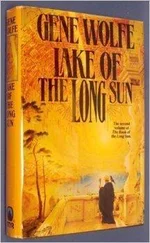Wolfe, Gene - The Best of Gene Wolfe
Здесь есть возможность читать онлайн «Wolfe, Gene - The Best of Gene Wolfe» весь текст электронной книги совершенно бесплатно (целиком полную версию без сокращений). В некоторых случаях можно слушать аудио, скачать через торрент в формате fb2 и присутствует краткое содержание. Жанр: Старинная литература, на английском языке. Описание произведения, (предисловие) а так же отзывы посетителей доступны на портале библиотеки ЛибКат.
- Название:The Best of Gene Wolfe
- Автор:
- Жанр:
- Год:неизвестен
- ISBN:нет данных
- Рейтинг книги:5 / 5. Голосов: 1
-
Избранное:Добавить в избранное
- Отзывы:
-
Ваша оценка:
- 100
- 1
- 2
- 3
- 4
- 5
The Best of Gene Wolfe: краткое содержание, описание и аннотация
Предлагаем к чтению аннотацию, описание, краткое содержание или предисловие (зависит от того, что написал сам автор книги «The Best of Gene Wolfe»). Если вы не нашли необходимую информацию о книге — напишите в комментариях, мы постараемся отыскать её.
The Best of Gene Wolfe — читать онлайн бесплатно полную книгу (весь текст) целиком
Ниже представлен текст книги, разбитый по страницам. Система сохранения места последней прочитанной страницы, позволяет с удобством читать онлайн бесплатно книгу «The Best of Gene Wolfe», без необходимости каждый раз заново искать на чём Вы остановились. Поставьте закладку, и сможете в любой момент перейти на страницу, на которой закончили чтение.
Интервал:
Закладка:
My aunt, who had previously been so remote, now spoke to me in the corridors and even visited our room. I learned that she controlled the interior arrangements of our house, and through her I was able to have a small laboratory of my own set up in the same wing. But I spent the winter, as I have described, mostly at my enamel dissecting table or in bed. The white snow drifted half up the glass of the window, clinging to the bare stems of the silver trumpet vine. My father’s patrons, on the rare occasions I saw them, came in with wet boots, the snow on their shoulders and their hats, puffing and red faced as they beat their coats in the foyer. The orange trees were gone, the roof garden no longer used and the courtyard under our window only late at night when half a dozen patrons and their protégées, whooping with hilarity and wine, fought with snowballs—an activity invariably concluded by stripping the girls and tumbling them naked in the snow.
S
pring surprised me, as she always does those of us who remain most of our lives indoors. One day, while I still thought, if I thought about the weather at all, in terms of winter, David threw open the window and insisted that I go with him into the park—and it was April. Mr. Million went with us, and I remember that as we stepped out the front door into the little garden that opened into the street, a garden I had last seen banked with the snow shoveled from the path but which was now bright with early bulbs and the chiming of the fountain, David tapped the iron dog on its grinning muzzle and recited: “ ‘And thence the dog. With fourfold head brought to these realms of light.’ ”
I made some trivial remark about his having miscounted.
“Oh, no. Old Cerberus has four heads; don’t you know that? The fourth’s her maidenhead, and she’s such a bitch no dog can take it from her.” Even Mr. Million chuckled, but I thought afterward, looking at David’s ruddy good health and the foreshadowing of manhood already apparent in the set of his shoulders, that if, as I had always thought of them, the three heads represented Maitre, Madame, and Mr. Million, that is, my father, my aunt (David’s maidenhead , I suppose), and my tutor, then indeed a fourth would have to be welded in place soon for David himself.
The park must have been a paradise for him, but in my poor health I found it bleak enough and spent most of the morning huddled on a bench, watching David play squash. Toward noon I was joined, not on my own bench, but on another close enough for there to be a feeling of proximity, by a dark-haired girl with one ankle in a cast. She was brought there, on crutches, by a sort of nurse or governess who seated herself, I felt sure deliberately, between the girl and me. This unpleasant woman was, however, too straight backed for her chaperonage to succeed completely. She sat on the edge of the bench, while the girl, with her injured leg thrust out before her, slumped back and thus gave me a good view of her profile, which was beautiful; and occasionally, when she turned to make some remark to the creature with her, I could study her full face—carmine lips and violet eyes, a round rather than an oval face, with a broad point of black hair dividing the forehead; archly delicate black eyebrows and long, curling lashes. When a vendor, an old woman, came selling Cantonese egg rolls (longer than your hand, and still so hot from the boiling fat that they needed to be eaten with great caution, as though they were in some way alive), I made her my messenger and, as well as buying one for myself, sent her with two scalding delicacies to the girl and her attendant monster.
The monster, of course, refused; the girl, I was charmed to see, pleaded, her huge eyes and bright cheeks eloquently proclaiming arguments I was unfortunately just too far away to hear but could follow in pantomime: it would be a gratuitous insult to a blameless stranger to refuse; she was hungry and had intended to buy an egg roll in any event—how thriftless to object when what she had wished for was tendered free! The vending woman, who clearly delighted in her role as go-between, announced herself on the point of weeping at the thought of being forced to refund my gold (actually a bill of small denomination nearly as greasy as the paper in which her wares were wrapped, and considerably dirtier), and eventually their voices grew loud enough for me to hear the girl’s, which was a clear and very pleasing contralto. In the end, of course, they accepted; the monster conceded me a frigid nod, and the girl winked at me behind her back.
Half an hour later when David and Mr. Million, who had been watching him from the edge of the court, asked if I wanted lunch, I told them I did, thinking that when we returned I could take a seat closer to the girl without being brazen about it. We ate, I (at least so I fear) very impatiently, in a clean little café close to the flower market, but when we came back to the park the girl and her governess were gone.
We returned to the house, and about an hour afterward my father sent for me. I went with some trepidation, since it was much earlier than was customary for our interview—before the first patrons had arrived, in fact, while I usually saw him only after the last had gone. I need not have feared. He began by asking about my health, and when I said it seemed better than it had been during most of the winter he began, in a self-conscious and even pompous way, as different from his usual fatigued incisiveness as could be imagined, to talk about his business and the need a young man had to prepare himself to earn a living. He said, “You are a scientific scholar, I believe.”
I said I hoped I was in a small way, and braced myself for the usual attack upon the uselessness of studying chemistry or biophysics on a world like ours where the industrial base was so small, of no help at the civil service examinations, does not even prepare one for trade, and so on. He said instead, “I’m glad to hear it. To be frank, I asked Mr. Million to encourage you in that as much as he could. He would have done it anyway, I’m sure; he did with me. These studies will not only be of great satisfaction to you, but will . . . ,” he paused, cleared his throat, and massaged his face and scalp with his hands, “be valuable in all sorts of ways. And they are, as you might say, a family tradition.”
I said, and indeed felt, that I was very happy to hear that.
“Have you seen my lab? Behind the big mirror there?”
I hadn’t, though I had known that such a suite of rooms existed beyond the sliding mirror in the library and the servants occasionally spoke of his “dispensary,” where he compounded doses for them, examined monthly the girls we employed, and occasionally prescribed treatment for “friends” of patrons, men recklessly imprudent who had failed (as the wise patrons had not) to confine their custom to our establishment exclusively. I told him I should very much like to see it.
He smiled. “But we are wandering from our topic. Science is of great value, but you will find, as I have, that it consumes more money than it produces. You will want apparatus and books and many other things, as well as a livelihood for yourself. We have a not-unprofitable business here, and though I hope to live a long time—thanks in part to science—you are the heir, and it will be yours in the end. . . .”
(So I was older than David!)
“. . . every phase of what we do. None of them, believe me, are unimportant.”
I had been so surprised, and in fact elated, by my discovery that I had missed a part of what he said. I nodded, which seemed safe.
“Good. I want you to begin by answering the front door. One of the maids has been doing it, and for the first month or so she’ll stay with you, since there’s more to be learned there than you think. I’ll tell Mr. Million, and he can make the arrangements.”
Читать дальшеИнтервал:
Закладка:
Похожие книги на «The Best of Gene Wolfe»
Представляем Вашему вниманию похожие книги на «The Best of Gene Wolfe» списком для выбора. Мы отобрали схожую по названию и смыслу литературу в надежде предоставить читателям больше вариантов отыскать новые, интересные, ещё непрочитанные произведения.
Обсуждение, отзывы о книге «The Best of Gene Wolfe» и просто собственные мнения читателей. Оставьте ваши комментарии, напишите, что Вы думаете о произведении, его смысле или главных героях. Укажите что конкретно понравилось, а что нет, и почему Вы так считаете.









